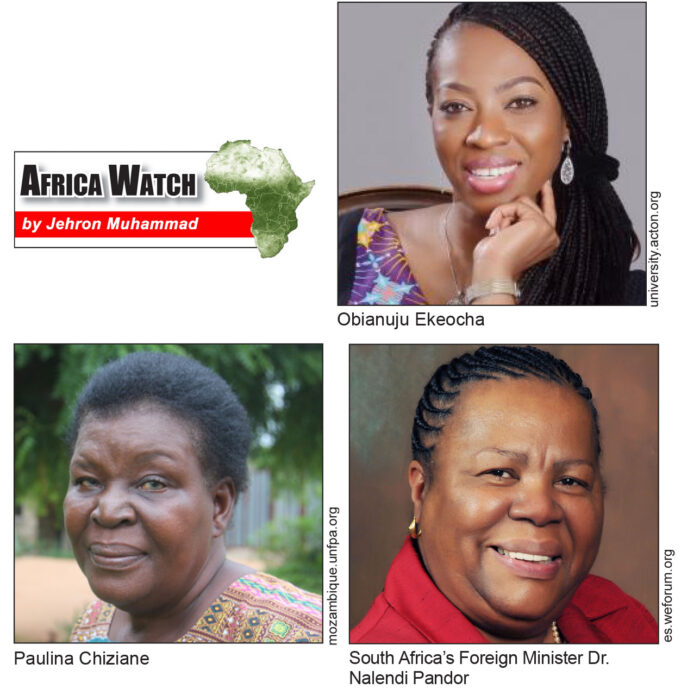As 2023 comes to a close we reflect on the accomplishments of African women, a demographic whose voices and contributions often receive too little coverage and insight. The increasing presence of African women as public leaders for example, in positions in the World Trade Organization, African Union and United Nations and as head of state in Tanzania, and foreign minister of South Africa, still receives too little notice.
Not only are African women in leadership positions but African women are out front championing causes that not only affect women, but they are helping to provide insight into the latest iterations of neo-colonialism on the continent through activism and writing.
Obianuju Ekeocha, founder and president of Culture of Life Africa, comes to mind. Ekeocha is known for championing pro-life efforts throughout Africa and for pointing out how foreign abortion funding fuels the “ideological colonization” of the continent. Also, in her book, “Target Africa: Ideological Neocolonialism in the 21st Century,” this human rights activist casts insight into the new colonialism and subjects it to critical scrutiny.
Ekeocha’s book is a must-read for complacent Westerners and for those believing their aid money is being put to good use in Africa, wrote David Paton, Chair of Industrial Economics at Nottingham University in the UK. She gives a masterful analysis “demonstrating in painful detail how Western governments, billionaires, and NGOs are systematically imposing a morality completely alien to many Africans,” Ekeocha writes.
“The fact is,” she writes, “colonialism for the people and peoples of Africa and other places did not really end, or, if it ended, it has been reinstituted. Today’s colonialism lacks the former features of the old colonialism—there are no longer viceroys, governors general, and occupying armies— but is nevertheless a type of colonialism—ideological colonialism.
The economically powerful and culturally dominant nations whose governing ideology is a form of what the late Robert Bellah described as ‘expressive individualism,’ use their hegemonic power to impose on the people of Africa and other developing nations … .”
Paulina Chiziane was the first woman to publish a novel in Mozambique and became the first African woman to receive the most important award for Portuguese literature, the Camões Prize. She’s also the first to break all the rules about what a writer may reveal about Mozambique’s patriarchal culture and social taboos.
According to conversation.com, she was born in Manjacaze in 1955 and raised in the capital, Maputo. Chiziane’s mother tongue is Chopi, a Bantu language spoken along the southern coast of Mozambique, which she practiced along with Portuguese, the language imposed during the colonial period. Today Chiziane has a degree in linguistics and is a leading global figure in Portuguese literature.
During her acceptance speech in Lisbon, she said, “I was walking without knowing my direction, and yet I arrived somewhere. I come from Africa. I am Black, and I am here, being the first Black woman to receive this high recognition … I am Black. Yes, and so what? If you want to be someone in life, in this world, you need to affirm your space. Leave traces of your feet on the ground, indelibly engraved, for other people to say: here someone has passed.”
Chiziane’s stories often reflect the social instability of a country oppressed by a war of liberation that was followed by civil conflicts after attaining independence from Portugal in 1975. Her writings reflect her commitment to the Frelimo liberation movement.
African women’s history of involvement in liberation movements is sacrosanct. A case in point is Ghanian president Kwame Nkrumah’s Egyptian wife, Fathia Halim Ritzk. She was adamant when she told Egyptian President Gamal Abdul Nasser, “I would like to go and marry this anti-colonial leader. I read his autobiography, I know of his trials and tribulations, of his struggles … and his spearheading the anti-colonial struggle upon his return to his homeland.”
Add to that, South Africa’s Foreign Minister Dr. Nalendi Pandor and her active involvement in condemning Israel for its massacre of Palestinians in Gaza over the last several weeks. Pandor is one of the principal reasons for South Africa’s recent severing of diplomatic ties with Israel.
And lastly, while Tasneem Hafiz is Palestinian in 2019 she participated in protests during the Sudanese revolution. Hafiz has lived in Sudan for 29 years, nearly all of her life, and has Sudanese family members.
She discussed being Palestinian and growing up in Sudan with 500wordsmag.com. “We both, as nations, share the same values of generosity, kindness and bravery. The only kind of living I have experienced and become accustomed to is in Sudan. Its people are incredibly pleasant, modest, loving and simple with no complications, and hospitable,’ she said.
“I can’t speak about the similarities between Sudan and Palestine without mentioning the shared beliefs of courageously and tirelessly fighting against tyranny and injustice,” she added.
Follow @JehronMuhammad on X, formerly known as Twitter













